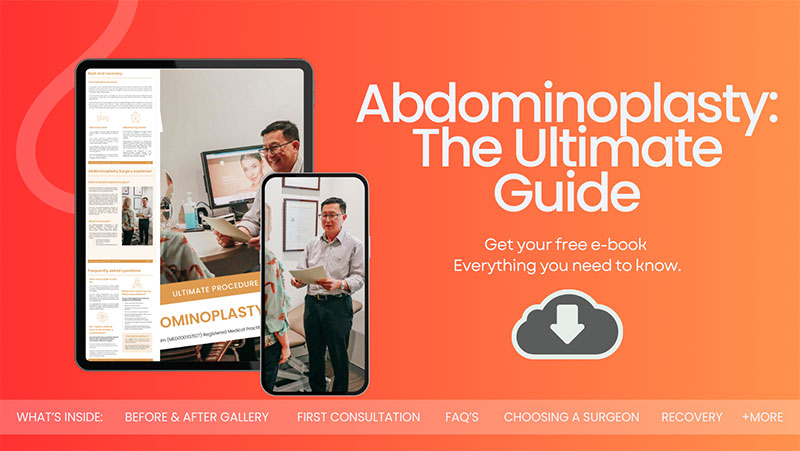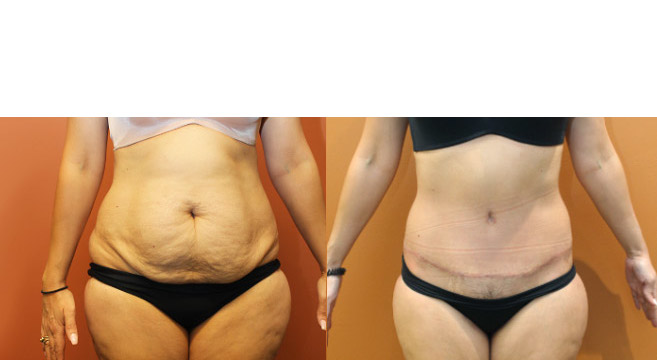Will Medicare Cover My Tummy Tuck – Abdominoplasty Surgery?
Abdominoplasty is a surgical procedure that removes excess skin and fat from the abdomen. Some patients might resort to the procedure for aesthetic purposes, while others might be interested in abdominoplasty for medical reasons. If you are wondering if you can get a Medicare rebate for your abdominoplasty surgery, this blog will give you details about the specific Medicare Item Numbers involved and other considerations associated with the procedure.
Sydney Plastic Surgeon Dr Jake Lim is committed to helping his patients make informed decisions about undergoing plastic surgery.
Dr Lim’s 2024 Abdominoplasty Guide

What Are Medicare Item Numbers?
Medicare Item Numbers are unique codes assigned to medical services, procedures, and consultations. These numbers help in identifying the type of service provided and are crucial for claiming Medicare benefits. For abdominoplasty, the relevant Medicare Item Numbers are 30166, 30175, 30176, 30177, and 30179.
· Item Number 30166
This item number covers the removal of excess skin and fat from the abdomen, usually following significant weight loss or pregnancy. The procedure aims to improve the appearance and contour of the abdomen.
Details: Removal of redundant abdominal skin and lipectomy, as a wedge excision, for functional problems following significant weight loss equivalent to at least 5 body mass index points and if there has been a stable weight for a period of at least 6 months prior to surgery, other than a service associated with a service to which item 30175, 30176, 30177, 45530, 45531, 45564, 45565, 45567, 46060, 46062, 46064, 46066, 46068, 46070, 46072, 46080, 46082, 46084, 46086, 46088 or 46090 applies (H)
· Item Number 30175
This item number is for a more complex abdominoplasty procedure that involves not just the removal of excess skin and fat but also the repair of abdominal muscles. This is often required after multiple pregnancies or significant weight fluctuations.
Details: Radical abdominoplasty, with repair of rectus diastasis, excision of skin and subcutaneous tissue, and transposition of umbilicus, not being a laparoscopic procedure, if:
(a) the patient has an abdominal wall defect as a consequence of pregnancy; and
(b) the patient:
(i) has a diastasis of at least 3cm measured by diagnostic imaging prior to this service; and
(ii) has either or both of the following:
(A) at least moderately severe pain or discomfort at the site of the diastasis in the abdominal wall during functional use and the pain or discomfort has been documented in the patient’s records by the practitioner providing the service;
(B) low back pain or urinary symptoms likely due to rectus diastasis and the pain or symptoms have been documented in the patient’s records by the practitioner providing the service; and
(iii) has failed to respond to non-surgical conservative treatment, that must have included physiotherapy; and
(iv) has not been pregnant in the last 12 months; and
(c) the service is not a service associated with a service to which item 30166, 30169, 30176, 30177, 30179, 30651, 30655, 45530, 45531, 45564, 45565, 45567, 46060, 46062, 46064, 46066, 46068, 46070, 46072, 46080, 46082, 46084, 46086, 46088 or 46090 applies
Applicable once per lifetime (H)

· Item Number 30176
This item number pertains to a radical abdominoplasty and it involves the removal of skin and repair of muscle for patients who had abdominal surgery before.
Details: Radical abdominoplasty, with excision of skin and subcutaneous tissue, repair of musculoaponeurotic layer and transposition of umbilicus, not being a service associated with a service to which item 30166, 30169, 30175, 30177, 30179, 45530, 45531, 45564, 45565, 45567, 46060, 46062, 46064, 46066, 46068, 46070 or 46072 applies, if the patient has previously had a massive intra-abdominal or pelvic tumour surgically removed (H)
· Item Number 30177
This item number is for abdominoplasty procedures that involve the correction of issues associated with skin-to-skin friction.
Details: Lipectomy, excision of skin and subcutaneous tissue associated with redundant abdominal skin and fat that is a direct consequence of significant weight loss, in conjunction with a radical abdominoplasty, with or without repair of musculoaponeurotic layer and transposition of umbilicus, not being a service associated with a service to which item 30166, 30175, 30176, 30179, 45530, 45531, 45564, 45565, 45567, 46060, 46062, 46064, 46066, 46068, 46070, 46072, 46080, 46082, 46084, 46086, 46088 or 46090 applies, if:
(a) there is intertrigo or another skin condition that risks loss of skin integrity and has failed 3 months of conventional (or non-surgical) treatment; and
(b) the redundant skin and fat interferes with the activities of daily living; and
(c) the weight has been stable for at least 6 months following significant weight loss prior to the lipectomy
(H)
· Item Number 30179
This item number is for extended abdominoplasty, which is performed when the excess skin is present not only on the abdominal wall, but on the flanks and back too.
Details: Circumferential lipectomy, as an independent procedure, to correct circumferential excess of redundant skin and fat that is a direct consequence of significant weight loss, with or without a radical abdominoplasty, not being a service associated with a service to which item 30175, 30176, 30177, 45530, 45531, 45564, 45565, 45567, 46060, 46062, 46064, 46066, 46068, 46070, 46072, 46080, 46082, 46084, 46086, 46088 or 46090 applies, if:
(a) the circumferential excess of redundant skin and fat is complicated by intertrigo or another skin condition that risks loss of skin integrity and has failed 3 months of conventional (or non-surgical) treatment; and
(b) the circumferential excess of redundant skin and fat interferes with the activities of daily living; and
(c) the weight has been stable for at least 6 months following significant weight loss prior to the lipectomy
(H)
How to Get Medicare Cover for Abdominoplasty

The coverage of abdominoplasty by Medicare is contingent on several factors:
- Medical Necessity: Medicare is more likely to cover the cost if the surgery is deemed medically necessary rather than cosmetic. Conditions such as chronic skin infections, hernias, or functional impairments can make the procedure medically necessary
- Consultation with a Specialist: A consultation with a specialist is essential for determining the medical necessity of the procedure. The specialist’s report will play a significant role in whether Medicare will cover the surgery. Keep in mind that you need a GP referral to see a plastic surgeon if you want to get Medicare rebate for abdominoplasty surgery
- Item Numbers: The specific Medicare Item Numbers used will also influence coverage.
How Much Will Medicare Cover?
The amount covered by Medicare varies depending on the Item Number and the specifics of the case. Generally, Medicare will cover 75% of the Medicare Benefits Schedule (MBS) fee for in-hospital services and 85% for out-of-hospital services. However, there will still be out-of-pocket expenses, such as surgeon fees, anaesthetist fees, and hospital costs that are not covered by Medicare.
For example, if your Medicare Item Number is 30179, the fee is $1,328.65 and the benefit is 75%. This means that Medicare will pay $996.50 for your abdominoplasty.
Private Health Insurance and Abdominoplasty
If you have private health insurance, it’s worth checking whether your policy covers abdominoplasty. Some policies offer coverage for procedures that are not fully covered by Medicare, potentially reducing your out-of-pocket expenses.
The Process of Claiming Medicare for Abdominoplasty
Before you go under the knife, it’s crucial to understand the process of claiming Medicare benefits for abdominoplasty. Here’s a step-by-step guide:
Step 1: Consultation with a General Practitioner (GP)
Your journey typically starts with a visit to your GP, who will assess your condition and refer you to a plastic surgeon if necessary.
Step 2: Specialist Consultation
The plastic surgeon will evaluate your medical history, current condition, and the reasons for seeking abdominoplasty. They will then provide a medical report that can be used to claim Medicare benefits.
Step 3: Submit a Claim
If you are eligible, the plastic surgeon will submit a claim to Medicare on your behalf.
Step 4: Medicare Assesses the Claim
Medicare will assess the claim and make a decision on whether to cover the procedure.
Keep in mind that post-operative care is essential for a successful recovery and may also be covered by Medicare, depending on the Item Numbers involved.
FAQs about Medicare and Abdominoplasty

Is abdominoplasty painful?
- Abdominoplasty involves surgical removal of excess skin and fat from the abdomen, and it may also include tightening of the abdominal muscles. The procedure itself is generally performed under general anaesthesia, so you shouldn’t feel pain during the surgery. However, post-operative pain is to be expected and can vary from person to person. Pain management is an important part of the recovery process, and your surgeon will likely prescribe pain medication to help manage discomfort in the days following the procedure.
How long is the recovery period?
- The recovery period for abdominoplasty can vary depending on the extent of the surgery and individual factors like age and overall health. Most patients can expect to return to light activities within two weeks. However, strenuous activities and heavy lifting should be avoided for at least six weeks. It’s crucial to follow the post-operative care guidelines provided by Dr Lim to ensure a smooth and safe recovery. Regular follow-up appointments will also be scheduled to monitor your progress.
Can I combine abdominoplasty with other procedures?
- Yes, it is possible to combine abdominoplasty with other cosmetic or medical procedures, such as liposuction, breast augmentation, or hernia repair. Combining surgeries can have the benefit of a single recovery period for multiple procedures. It’s important to consult with an experienced plastic surgeon to assess your suitability for multiple procedures, as it may increase the risks and complexity of the surgery.
Is it mandatory to get a GP referral if I want to get Medicare for Abdominoplasty?
- In Australia, if you’re seeking to have some of the costs of your abdominoplasty covered by Medicare, a referral from a General Practitioner (GP) is required. The referral is crucial for Medicare to consider the procedure medically necessary rather than purely cosmetic. Without a GP referral, it’s unlikely that Medicare will contribute to the costs. It’s essential to consult with your GP and an experienced plastic surgeon to determine if your case may be eligible for Medicare benefits. Keep in mind that even with Medicare, you will still be responsible for some out-of-pocket expenses.
Further Reading about Body Surgery with Dr Jake Lim
- Read Dr Lim’s Extended Abdominoplasty Surgery Page
- Read Dr Lim’s Blog about Recovery after Tummy Tuck – Abdominoplasty
- Read Dr Lim’s Abdominoplasty Surgery Page
- Read Dr Lim’s Blog about Split Muscles after Pregnancy – Diastasis Recti
- See Dr Lim’s Abdominoplasty Photo Gallery
- Read Dr Lim’s Blog about How to choose the Best Compression Garments after an Abdominoplasty
Medical References about Abdominoplasty and Medicare
- Tummy tuck – Mayo Clinic
- Your guide to a tummy tuck – before, during and after
- Abdominoplasty (Tummy Tuck): Risks, Recovery
About Dr Jake Lim
Highly qualified and experienced specialist plastic surgeon Dr Jake Lim focuses on facial plastic, cosmetic breast and body contouring after significant weight loss
Dr Lim creates the best possible plastic surgery results for his Australia-wide and international patients.
Dr Lim is passionate about making sure each and every patient has access to the right information about available treatments and procedures and is able to make well-informed decisions.
At My Klinik, patient safety, education and achieving optimal results are our top priorities.




